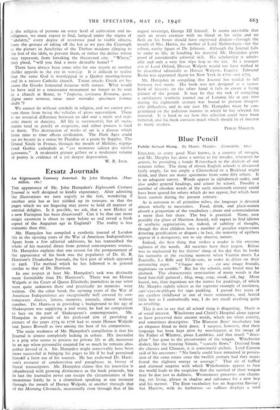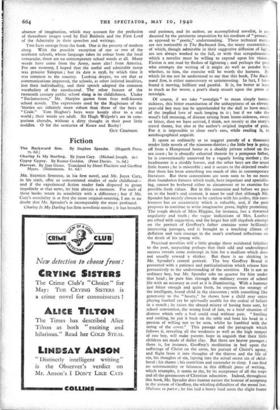Blue Pencil
Public School Slang. By Morris Marples. (Constable. los.)
ENGLAND, as every good Nazi knows, is a country of savages, and Mr. Marples has done a service to the invader, whenever he arrives, by providing a handy VG orterbuch to the dialects of our remoter tribes. The slang of eleven English schools is discussed fairly amply, far too amply a Chesterfield or a Beckford might think, and there are many specimens from some fifty others. It is an adequate survey. Words appear in alphabetical order, and also under general headings, and school by school. Possibly a number of obsolete words of the early nineteenth century could have been spared for others which do not appear, but which have been current during the present century.
As is common to all primitive tribes, the language is devoted almost wholly to necessities. Food, drink, and place-names absorb a proportion of the vocabulary ; abuse and commendation a more than fair share. The boy is practical. None, save possibly the ghost of Matthew Arnold, will expect to find idioms of aesthetic appreciation, or, indeed, of subtlety of thought, though the dear children have a number of peculiar expressions denoting gratification or disgust ; in fact, the majority of epithets appear of a derogatory, not to say abusive, nature.
Indeed, the first thing that strikes a reader is the extreme ugliness of the words. All societies have their jargon. Balzac was so enchanted by the thieves' slang of his day that he broke his narrative at the exciting moment when Vautrin meets La Pouraille, La Biffe and Fil-de-soie, in order to dilate on their entrancing argot. "Chaque mot . . en une image brutale, ingenieuse ou terrible." But for the schools, only brutal may be claimed. The characteristic termination of many words is the hard hate-full guttural ; blog, mug, scug, sneak, oik, fug. More brutal, too, than ingenious are the names for puddings, of which Mr. Marples rightly selects as the supreme example of nastiness, cats'-eyes-in-phlegm for sago pudding. I passed five years of my careless childhood in one of these seminaries, and, horrid little boy as I undoubtedly was, I do not recall anything quite so revolting.
This is not to say that all school slang is disgusting. Much is of social interest. Winchester and Christ's Hospital alone appear to have preserved their ancient words, which are often comely, and sometimes descriptive. The Bluecoat Boys' vocabulary has an elegance fitted to their dress. I suspect, however, that their language has been kept alive by worshippers at the image of the Father of Whimsy, pious Lambkins, and that much " disci- pline " has gone to the preservation of the tongue. Winchester dialect, like the freezing Simois, "scarcely flows." Derived from the classics and Chaucer, it is consciously archaic. Lord Curzon said of his ancestors : "No family could have remained in posses- sion of the same estate since the twelfth century had they mani- fested the slightest energy or courage." That air of baffled and alarmed surprise with which Wykehamists appear to face the world leads to the suspicion that the survival of their tongue may be due just to dullness. Westminster preserves one charm- ing, yet living, phrase in shadow and substance for a new boy and his mentor. The Eton vocabulary has an Augustan flavour ; but Harrow, with its barbarous -er suffixes displays a total
absence of imagination, which may account for the profusion of threadbare images used by Earl Baldwin and the First Lord of the Admiralty in their speeches and writings.
Two facts emerge from the book. One is the poverty of modern slang. With the possible exception of one or two of the northern schools, whose language takes its colour from the local vernacular, there are no contemporary school words at all. Many words have come from the Army, more alas! from America. For one moment, I hoped that the useful and admirable torirp was genuine Salopian ; but its date is 1938, by which time it was common to the country. Looking deeper, we see that as communications improved, the schools, as other isolated localities, lost their individuality, and their speech adopted the common vocabulary of the uneducated. The other feature of the twentieth century public school slang is its childishness. Under "Exclamations," Mr. Marples quotes from four well-known school novels. The expressions used by the Rugbeians of the 'thirties are infinitely more robust than those of the boys at " Crak." Tom Hughes's boys were keenly alive to a real world ; their words are adult. Sir Hugh Walpole's arc in com- parison cherubs, without a dirty thought in their poor little noddles. 0 for the centuries of Keate and Busby!
GUY CHAPMAN.































 Previous page
Previous page